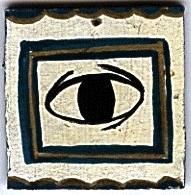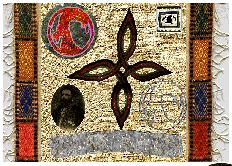When I came out of college with a Creative Writing MA from Brown, I had
no reason to believe my interests would ever get me even close to a
computer. Even after I went back to school to work on my Linguistics
degree and did borrow an Osborne to write my papers, the computer was
not on my radar screen. It was just a glorified typewriter. It is
interesting that my desire to buy one and work with it came upon me only
after I had entertained the thought of making that darn thing write in
Amharic. Suddenly, I was hooked. It is also interesting to remember
how I would see the same reaction in other Ethiopians, who had even less
reason than I to be interested in computing. As soon as I would even
mention what I was doing, the computer would make sense. A lot of it
was sheer giddiness at the idea, but it fascinated everyone. It was as
if the connection made the computer real. For me it was like
re-discovering the Ethiopian writing system.
 My first computer was an Apple IIc. I tried all sorts of font
generating programs on it--Gutenberg, Scribe, Fontrix. I even tried my
hand at Basic--a far cry from the days of computer-agnosis. But, I
never bought the Mac, never got hooked on Apple. My first real break
came with ChiWriter--probably the best DOS based word processor with
pixel-level control; you could copy vertical portions of the screen!
The only drawback for Ethiopic was that it didn't have a good keyboard
mapping system. We used the F keys. I was able to cobble something
with Superkey to make the system serviceable, and I did end up with a
typical Ethiopian typewriter keyboard with the shift-keys on the right.
The system worked well enough for me to produce a family newsletter.
My first computer was an Apple IIc. I tried all sorts of font
generating programs on it--Gutenberg, Scribe, Fontrix. I even tried my
hand at Basic--a far cry from the days of computer-agnosis. But, I
never bought the Mac, never got hooked on Apple. My first real break
came with ChiWriter--probably the best DOS based word processor with
pixel-level control; you could copy vertical portions of the screen!
The only drawback for Ethiopic was that it didn't have a good keyboard
mapping system. We used the F keys. I was able to cobble something
with Superkey to make the system serviceable, and I did end up with a
typical Ethiopian typewriter keyboard with the shift-keys on the right.
The system worked well enough for me to produce a family newsletter.
I was giving copies of the fonts out to people, however, when someone
who claimed to have ``invented'' the Ethiopic characters on the ChiWriter
keyboard before me began to harass me to make me stop working on my
project. I did not want to be responsible for any acrimony in our
community, but acquiescing to his demands would, I thought, set
very bad precedence for me and other developers, so I refused to accept
his argument. The other developers I knew at that time were Mulugeta
Kebede who was doing excellent work on the Mac, Ato Abate who didn't
develop anything himself, but was excitedly promoting the excellent
software from Duke University, and Fesseha Atlaw, whose company Dashen had
already been in the business of selling a DOS based Ethiopic word
processing system. The five of us came together, I believe in the
summer of 1989, and had a demonstration of our wares in a Church in
Adams Morgan, DC.
Soon after, I did stop work on ChiWriter and started to work with Word
Perfect 5.1. It was the word processor of choice at that time.
Here is the story about selling GohaTibeb. First, about the name--my
father thought it up while he was visiting us in DC. I had always
wanted to sell GohaTibeb as shareware, asking for minimal
contributions. But the GohaTibeb Association decided against it. The
decision was right. There really was no market there. One option had
been to go with ``dongles''--those hardware pieces that lock the parallel
port. Thank god we didn't go that far. We had a handful of buyers, but
finally gave it up when the Association broke up. Eventually, I put the
whole thing in the public domain. We never really considered anyone
competition.
Editor's Note:- The HP SoftFonts used in printing Goha from WordPerfect were later converted into the GFF
Ge'ezFree Zemen
font and put back into the public domain as the first freely
available Unicode compliant Ethiopic font.
 Ato Yitna Firdyiwek is currently an Instructional Technology Advisor at the University of Virginia where he is also working on his doctorate in education and instructional technology. He has recently left Northern Virginia Community College after 7 years.
Ato Yitna Firdyiwek is currently an Instructional Technology Advisor at the University of Virginia where he is also working on his doctorate in education and instructional technology. He has recently left Northern Virginia Community College after 7 years. My first computer was an Apple IIc. I tried all sorts of font
generating programs on it--Gutenberg, Scribe, Fontrix. I even tried my
hand at Basic--a far cry from the days of computer-agnosis. But, I
never bought the Mac, never got hooked on Apple. My first real break
came with ChiWriter--probably the best DOS based word processor with
pixel-level control; you could copy vertical portions of the screen!
The only drawback for Ethiopic was that it didn't have a good keyboard
mapping system. We used the F keys. I was able to cobble something
with Superkey to make the system serviceable, and I did end up with a
typical Ethiopian typewriter keyboard with the shift-keys on the right.
The system worked well enough for me to produce a family newsletter.
My first computer was an Apple IIc. I tried all sorts of font
generating programs on it--Gutenberg, Scribe, Fontrix. I even tried my
hand at Basic--a far cry from the days of computer-agnosis. But, I
never bought the Mac, never got hooked on Apple. My first real break
came with ChiWriter--probably the best DOS based word processor with
pixel-level control; you could copy vertical portions of the screen!
The only drawback for Ethiopic was that it didn't have a good keyboard
mapping system. We used the F keys. I was able to cobble something
with Superkey to make the system serviceable, and I did end up with a
typical Ethiopian typewriter keyboard with the shift-keys on the right.
The system worked well enough for me to produce a family newsletter.